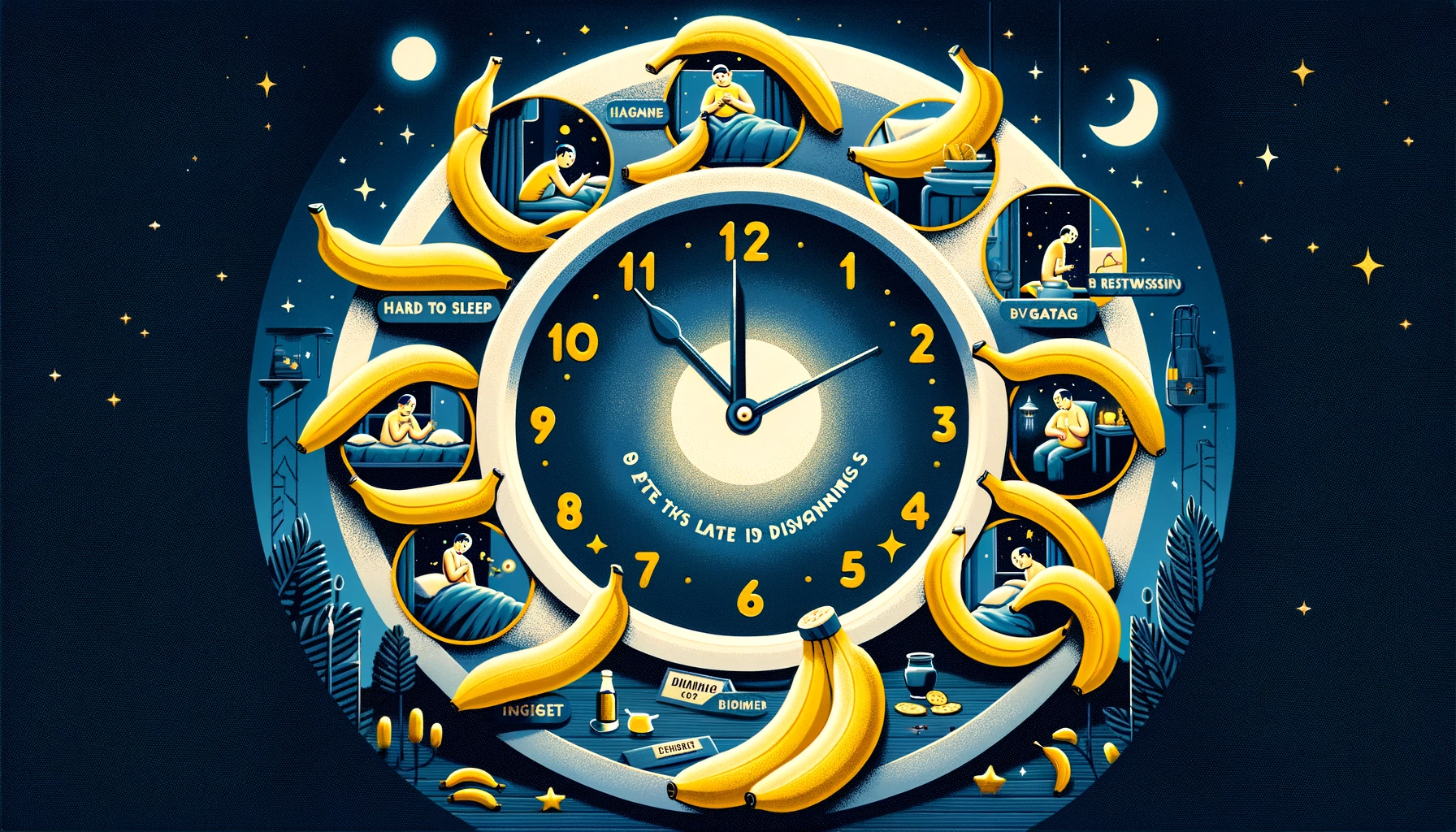
It's a common belief that grabbing a banana before bed is a healthy choice, but have you ever considered What Are the Shocking Disadvantages of Eating Bananas at Night?
While these fruits are celebrated for their nutritional benefits, indulging in them as a nighttime snack might not be as beneficial as you think. This exploration is crucial, especially for those mindful of their sleep quality and overall health.
Unravelling the truth behind this seemingly innocent habit can reveal surprising insights about the impact of our dietary choices.
The Surprising Science Behind Bananas
The Surprising Science Behind Bananas: Bananas, often hailed as a powerhouse of nutrition, are packed with elements that have a significant impact on our body, especially at night.
They are rich in natural sugars like fructose and glucose, which provide quick energy boosts but can lead to blood sugar spikes during the quieter hours of the night when metabolism slows down.
While fibre is beneficial for digestion, its consumption before bedtime can cause discomfort, as the body's digestive process slows down during sleep. Furthermore, bananas are abundant in vitamins, such as B6 and C, and essential minerals like potassium and magnesium.
These nutrients are vital for overall health but can have nuanced effects at night, such as elevated potassium levels or potential interference with sleep-inducing melatonin production.
Digestive Dilemmas: How Bananas Affect Your Gut At Night
Consuming bananas before bedtime can lead to surprising digestive dilemmas. Despite their nutritional benefits, the high fibre content in bananas can be a double-edged sword in nighttime digestion.
Fibre aids digestion and is beneficial for gut health, but its consumption close to bedtime can backfire. Nutritional studies indicate that our digestive system slows down during sleep, making it less efficient in processing high-fibre foods like bananas.
Digestive issues affect sleep quality. Nutrition and sleep research experts emphasize the importance of lighter, easily digestible snacks for those prone to digestive issues.
The natural sugars in bananas can ferment in the gut, contributing to gas and bloating.
Sleep Patterns And Bananas: A Complex Relationship
The relationship between banana consumption and sleep patterns is intriguingly complex. Bananas have tryptophan, which becomes serotonin and then melatonin, helping you sleep.
This suggests that bananas have the potential to promote better sleep. Studies, such as those published in the National Library of Medicine, have found that magnesium can improve insomnia symptoms and overall sleep quality.
However, their sugar content might counterbalance the sleep-promoting benefits of bananas. The natural sugars in bananas can lead to blood sugar spikes, particularly problematic at night when the body's metabolism is slower.
Such fluctuations can disrupt sleep patterns, potentially leading to restless nights.
While the tryptophan and magnesium in bananas can foster sleep readiness, the impact of their sugar content on blood sugar levels and subsequent sleep quality cannot be overlooked.
This duality makes the effect of bananas on sleep a subject of ongoing research and debate in nutritional science.
Weight Gain Worries: Does Eating Bananas At Night Contribute?
The concern about nighttime snacking and weight gain extends to bananas, a common choice for a late snack. Bananas are high in sugar and carbs, so limit consumption if you're trying to manage your weight.
When you eat bananas at night, the body's slower metabolism can lead to these carbohydrates being stored as fat rather than being used as energy, potentially contributing to weight gain.
In comparison to other common snacks, bananas are relatively low in calories. A medium-sized banana contains about 105 calories, making it a better option than high-calorie, processed snacks.
Moreover, the fibre in bananas promotes satiety, reducing the likelihood of overeating.
Bananas And Blood Sugar Levels: Nighttime Nuances
Bananas affect blood sugar levels, especially at night, for people with diabetes or who monitor blood sugar.
Bananas contain natural sugars that affect blood sugar levels. While these sugars provide a quick energy source during the day, consuming bananas at night can lead to blood sugar spikes. This effect is amplified during nighttime when the body's metabolism slows, and insulin sensitivity decreases.
For individuals with diabetes or those who are pre-diabetic, these nighttime sugar spikes can be particularly concerning. The body's reduced efficiency in regulating blood sugar levels during sleep can lead to prolonged periods of elevated blood sugar, which can be harmful in the long term.
It's important for such individuals to carefully consider the timing of consuming bananas.
While bananas are a healthy snack, there might be better choices than their high sugar content at night for blood sugar management.
It's advisable to opt for snacks with a lower glycemic index or to consume bananas earlier in the day when the body is more capable of managing blood sugar fluctuations.
Alternatives To Nighttime Banana Snacking
For those looking for healthier or more suitable alternatives to bananas for nighttime snacking, several options can be more conducive to sleep and overall health. A good alternative is a small serving of nuts, like almonds or walnuts.
These nuts are lower in sugar and provide healthy fats and protein, which can promote satiety without the risk of blood sugar spikes.
Another excellent choice is a small serving of Greek yogurt. It's a source of protein and contains less sugar than bananas, aiding in stabilizing blood sugar levels through the night.
Greek yogurt can also be soothing for the stomach, unlike the potential digestive disturbances that bananas might cause. For those craving something sweet, berries like blueberries or strawberries are a great option.
FAQs
Can Eating Bananas At Night Lead To Digestive Issues?
Due to their high fibre content, bananas can cause digestive discomfort like bloating or indigestion at night when the digestive process slows down.
Are Bananas A Good Snack For Weight Management At Night?
Bananas are lower in calories than many snacks, but their carbohydrate content can hinder nighttime fat-burning processes, making them less ideal for weight loss.
Do Bananas Positively Or Negatively Affect Sleep?
Bananas contain tryptophan and magnesium, which can aid sleep, but their sugar content may disrupt sleep patterns, creating a complex relationship with sleep.
How Do Bananas Impact Blood Sugar Levels During The Night?
Bananas can cause blood sugar spikes at night, which is problematic for people with diabetes or blood sugar issues.
What Are Healthier Nighttime Snack Alternatives To Bananas?
Small servings of nuts, Greek yogurt, berries, or whole-grain crackers with cheese or avocado are healthier alternatives due to lower sugar content and balanced nutrition.
Is It Harmful For Everyone To Eat Bananas At Night?
While not necessarily harmful for everyone, individuals with specific health concerns like diabetes, digestive issues, or weight management goals should consider limiting bananas at night.
Final Thoughts
The seemingly innocent habit of eating bananas at night unveils surprising disadvantages that individuals should consider for better sleep quality and overall health. While bananas offer nutritional benefits, their impact on blood sugar levels, digestive processes, and sleep patterns is intricate.
The high fibre content may lead to digestive discomfort, and the natural sugars can cause blood sugar spikes, which is especially problematic during the night when metabolism slows down.
